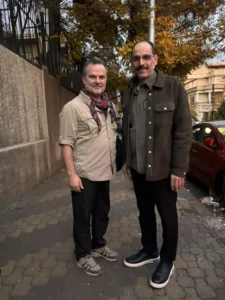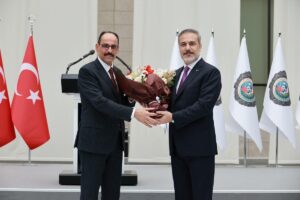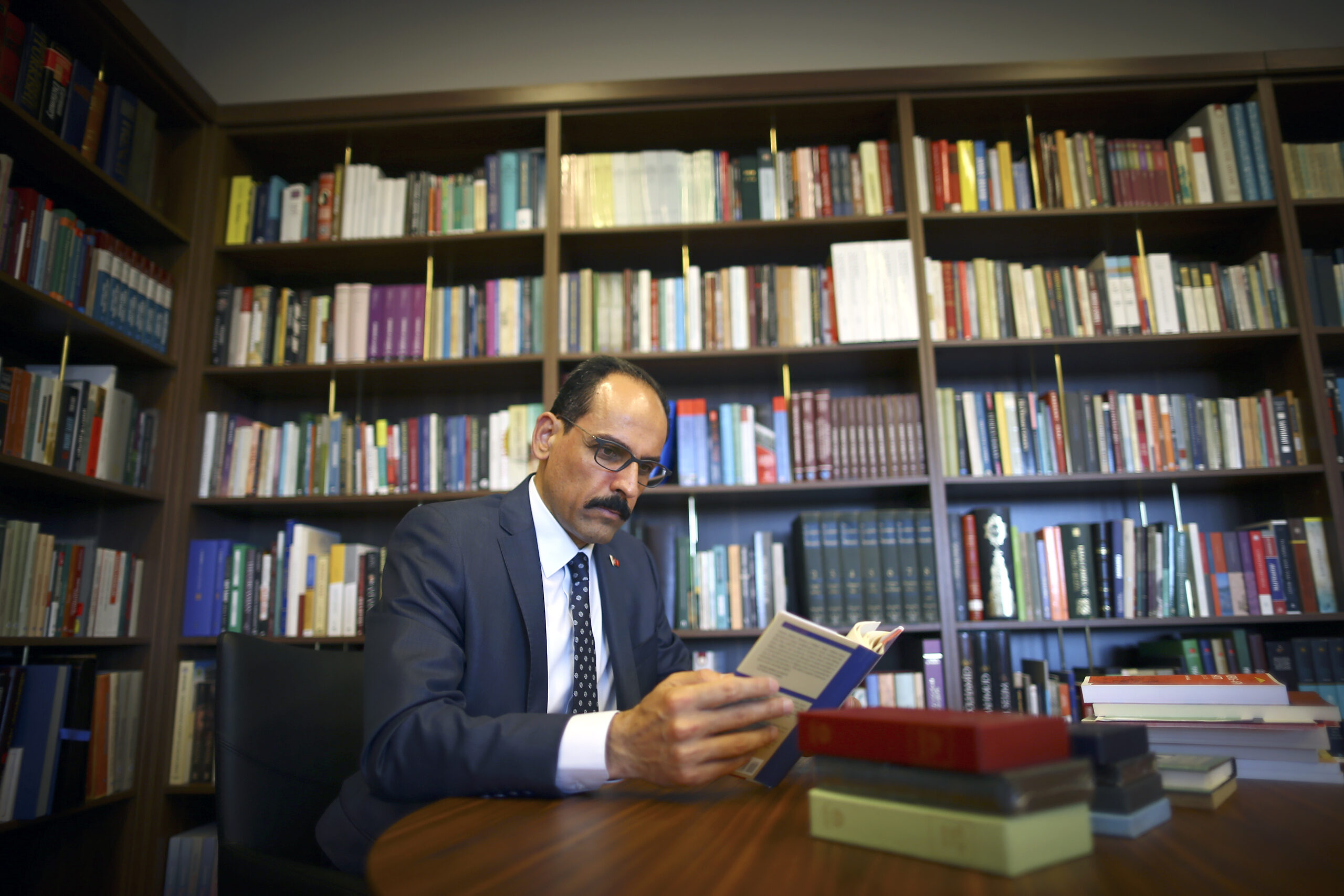On November 17, the opposition launched an offensive against the Assad regime that shocked the world, and the opposition reached the center of Damascus in 11 days. The 61-year-old Assad regime was toppled on December 8, 2024, and disappeared into history.
While the big powers did not know what position to take in the face of this unusually fast development, Ahmad Ash-Shera, the leader of the Hayat Tahrir al-Sham (HTS) movement, made statements that surprised everyone and life in the cities returned to normal in 4 days.
There was no chaos, no massacres, no revenge, and the people adapted to the situation very quickly.
Ash-Shera’s diplomatic statements, his all-embracing statements, his carefully crafted messages naturally attracted the attention of all states, politicians, and media. Then everyone started to think and question that there was a state mind behind this rapid action, behind these political statements.
Until December 12, there were speculations that this state mind was the UK, the US, Israel, and Russia. No one wanted to believe that HTS and other groups were changing, transforming, and making progress.
On December 12, the publication of a single photograph put an end to all speculations.

A head of intelligence in Damascus
While the states had not yet decided how they would relate to the new Syrian government and what position they would take, a very surprising and unbelievable news story began to spread in the media. Ibrahim Kalın, the head of the Turkish Intelligence Organization (MIT), had arrived in Damascus.
All sources were bombarded with phone calls to confirm the news, but there was no response.
Then an image taken by citizens began to circulate on the streets of Damascus. It showed the head of the National Intelligence Organization (MIT) Ibrahim Kalın and the new leader of Syria, Ahmad al-Shera, in the front of a car.
However, the image was not clear and everyone was trying to confirm this incredible image.
The author of this article saw the famous car on the streets of Damascus and confirmed that Ibrahim Kalın and Ahmad al-Shera were in it. Shera was driving, and Kalın was sitting next to him.
This extraordinary situation quickly spread around the world, but what really ended the controversy was the publication on December 12, 2024, of a photograph of the head of the Turkish National Intelligence Organization, Ibrahim Kalın, praying at the Umayyad Mosque in Damascus.
It became clear that the head of Turkish intelligence was in Damascus and that he was in Damascus for a series of meetings and visits.
From then on, the world started to talk about Türkiye’s significant influence on the revolution in Syria.
In fact, Türkiye sent the following message to the world by sending its intelligence chief to Damascus: Türkiye was not only present in Idlib, Azaz, and Jarablus, but also in the heart of Damascus and showed that it stood by the legitimate representatives of the Syrian people.

Who is Ibrahim Kalın?
Everyone wondered about the head of the National Intelligence Organization (MIT), who was photographed with a humble face at the Umayyad Mosque and on the streets of Damascus.
In fact, he was not an unknown person. When he was President Erdoğan’s spokesperson, he was a name frequently seen in the world media. His intellectual work was recognized in the scientific community from the US to the UK.
But now he had become invisible in the world of intelligence, one of the most difficult jobs in the world. Ibrahim Kalın had a profile about whom the more unknown aspects were revealed, the more astonished he became.
A career that went from being an academic to the head of intelligence
“Actually, I never had any plans for politics or government service. Since I was a little boy, I envisioned myself as a scholar, an academic, and that was always my dream for the future. Praise God, I have partially realized it, so I also have an academic life.”
This is how İbrahim Kalın described his career path in an interview with the press. However, life brought him to a place he perhaps never imagined.
His family originated from Erzurum, a province in eastern Türkiye known for its cold winters, high mountains, and folk songs.
He was born in Istanbul in 1971 and went to middle and high school in different cities. He returned to his hometown for university and studied history at Istanbul University. He had closely followed political developments since his student years and had set his mind on an academic career in those days. During his youth, he was called “agabeg” in Erzurum dialect among his friends. This was because he acted like a fatherly, benevolent older brother.
In 1992, after graduating from university, he went to Malaysia for his master’s degree. He studied Islamic thought and philosophy.
Kalın returned to Türkiye in 1994 after completing his master’s degree on the philosophy of Mullah Sadra, and a year later he went to the United States. In the U.S., first at Holy Cross and then at Georgetown University, he completed his Ph.D. in comparative humanities and philosophy on “Mullah Sadra’s theory of knowledge and the possibility of an anti-subjectivist epistemology.”
In 2002, he received his doctorate from this university. On that date, a fork in the road appeared for him.
The decision at the crossroads
The year Dr. İbrahim Kalın received his Ph.D. from Georgetown University, a major political change was taking place in Türkiye. Recep Tayyip Erdoğan had won a landslide victory in the 2002 elections and had become the sole ruler of the country.
After the biggest political success ever achieved by conservative politics, a major change began to take place in Türkiye.
Erdoğan began to gather around him the intellectuals, careerists, and talented young people of the conservative community.
Dr. İbrahim Kalın was one of the young people who stood out with his career and knowledge. AK Party officials proposed to Dr. İbrahim Kalın to come to Türkiye to establish an international think tank and generate ideas for Türkiye.
Dr. İbrahim Kalın hesitated for a while between continuing his academic career at Georgetown University and returning to Türkiye to start a political career
In the end, he accepted the offer, and at the age of 34, in 2005, he came to Türkiye and founded SETA (Foundation for Political, Economic and Social Research). Since then, he has worked closely with Prime Minister Erdoğan. This closeness was the beginning of İbrahim Kalın’s career story, which would lead him to become the Head of Intelligence who prayed at the Umayyad Mosque in Damascus.
Can bureaucracy and academia go hand in hand?
İbrahim Kalın’s disciplined reading and writing process, which he had been doing since his university years, continued a little more easily when he became the President of SETA. However, Prime Minister Erdoğan offered him a new position to bring him closer to him. When his Foreign Policy Advisor Prof. Ahmet Davutoğlu became Foreign Minister, İbrahim Kalın was suddenly thrust into the dizzyingly fast and intense work of the Prime Ministry. However, he persistently did not abandon his academic work. He published numerous books of opinion, and in 2020 he was awarded the title of professor.
“I became a professor, but I don’t use these titles much… Titles are adjectives added to people. What is essential is the substance, that is, the human being himself. They are important in terms of being appreciated, but these are professional titles. Professorship is an administrative position, not an academic one. If you ask me, titles are things that obscure the real identity and knowledge of a person.”

After Erdoğan became President, İbrahim Kalın rose once more in his political career as Ambassador and Presidential Spokesperson. Since then, he has worked intensively in media, politics, academia, and diplomacy. In the meantime, he did not neglect to write books on philosophy and ideas. His books were published at Oxford University in the UK and Brigham Young University in the US and later translated into many languages.
“We have a very busy schedule because of our jobs, but we try to manage our time well. I benefit from the discipline of reading and writing that comes with being an academic. In our job, there is no concept of weekend or day and night. We are always ready for duty. Therefore, many pages of this book were written on airplanes, in the hotels of the countries we visited, waking up early on Sunday mornings and staying up late at night. After I started working with the President, I tried to learn from his disciplined use of time, because he is a very efficient user of time.”
A musician and composer intelligence chief
İbrahim Kalın, who was interested in Turkish music during his high school years, learned to play the saz during this period. His music teacher Mithat Hoca was the one who taught him how to play the saz and made him love music in Alanya.
Kalın never put down the saz and also sang folk songs. In America, he formed a music ensemble with his friends and even gave small concerts.
He not only played the saz but also blew the ney. The folk songs he composed in Türkiye were sung by famous artists.
He was influenced by the famous philosopher Farabi’s books on music theory and described his interest in music as follows:
“My relationship with music and art is not a hobby, not something I do to spend my free time. I see it as part of my self-realization, as part of my effort to make sense of existence, because it enriches me and makes what I do more meaningful. Things I try to do because they are valuable and important.”

Adding an academic dimension to intelligence
It is not unusual for a professor of philosophy to be the head of intelligence. However, Kalın has spent the last 20 years in close proximity to Erdoğan, intensely engaged in politics, diplomacy, and security. He is familiar with all the security and diplomatic files involving Türkiye. That is why he was appointed by President Erdoğan in June 2023 as the head of the National Intelligence Organization (MİT) after Hakan Fidan, the head of MİT, was appointed Foreign Minister. It is said that İbrahim Kalın’s bureaucratic career was as influential in this appointment as the trust between him and Erdoğan.
After Kalın became the head of MİT, he started to deal with very serious files. He fought against terrorist organizations such as PKK, DAESH, Al-Qaeda, and FETO. He played an active role in the Gaza war, where a great genocide was taking place, to ensure a ceasefire.
Meanwhile, he broke up a large network of Mossad agents operating in Türkiye. On August 1, 2024, in the biggest exchange operation in recent history, he ensured that the hostage exchange of 7 countries, including the US, Russia, and Germany, took place in Ankara.
During his presidency, İbrahim Kalın started to reflect his academic side to the functioning of the institution. One of his first actions was to establish the Intelligence Academy. Here, he initiated security, intelligence, and geopolitical studies at the master’s and doctoral levels. The Intelligence Academy also published regular reports on crisis issues around the world.
In this way, Kalın somehow combined the academic side with the intelligence side. Surprisingly, he wrote another book, Islam, Enlightenment and the Future, while he was head of intelligence.
What will he do in the balance between security and freedom?
One of the oldest debates in politics, the balance between security and freedom, is a vital issue for every country. Türkiye, on the other hand, is one of the rare countries that has had very painful experiences and debates on these two issues. There are serious wars, terrorism, migration, and civil wars around the country and in its neighbors. These conflicts often lead to massive migration, acts of terrorism, and even military coups within Türkiye.
As Türkiye’s security sensitivity increases during these events, it also becomes the center of debates on restricting freedoms. In his books, articles, and interviews, İbrahim Kalın used to emphasize coexistence, peaceful coexistence with all ethnic and religious structures, and democracy. Now, as the head of the most important institution of the security bureaucracy, he has become the main actor in these debates.
“Kalın delivered a rare public address as the head of MİT during a ceremony marking the anniversary of MİT’s founding and the establishment of the Intelligence Academy. In his speech, he articulated his guiding principle: ‘ensuring security without compromising freedoms.’ He encapsulated this philosophy with the succinct statement, ‘Security exists for the sake of freedom.'”
It is not hard to imagine how difficult it would be to implement this pro-freedom stance in the Middle East, which has become a ring of fire. However, we have started to see the results of this approach in Syria.
As a unique figure—being the only philosopher, musician, and academic among intelligence chiefs worldwide—I believe İbrahim Kalın will continue to capture global attention.


